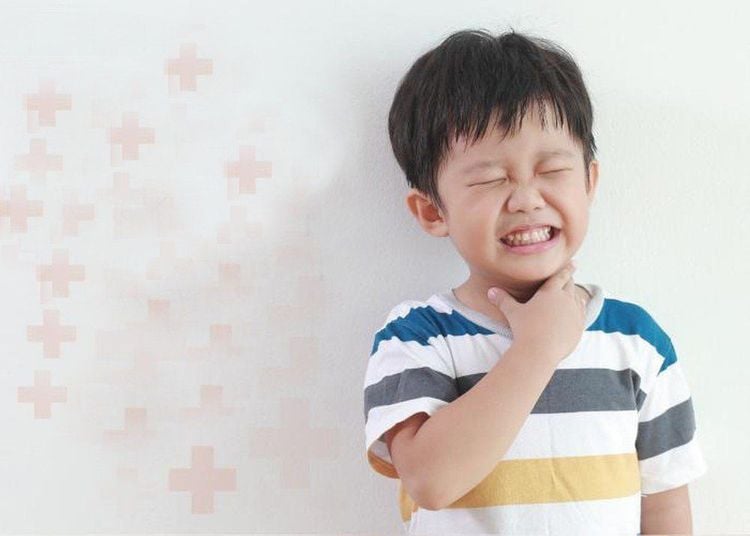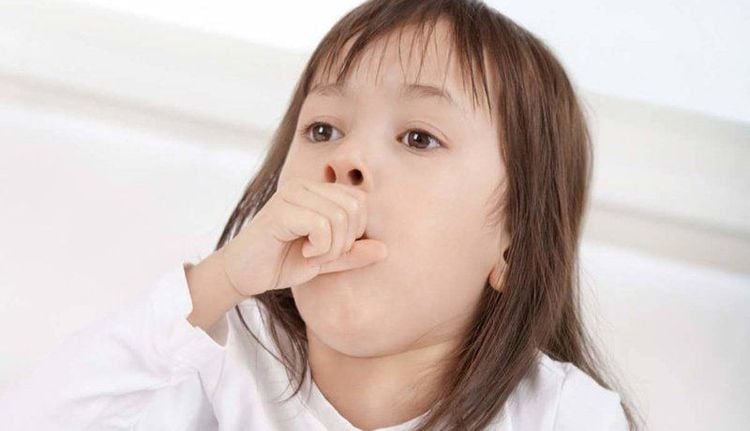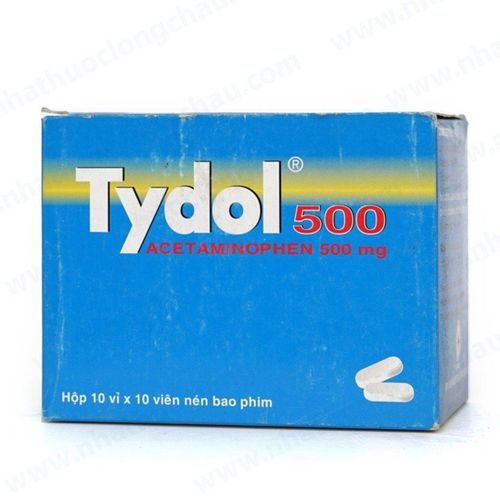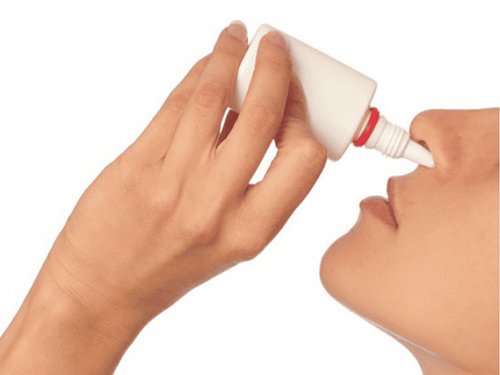This is an automatically translated article.
Pharyngitis in children is caused by infection with Group A Streptococcus bacteria. Children with pharyngitis often have high fever and sore throat that interferes with eating and drinking. Therefore, parents need to recognize early symptoms to take their children to medical centers for examination and treatment.1. Signs of children with pharyngitis
Pharyngitis in children is a disease caused by group A Streptococcus bacteria (also known as streptococcus). The disease usually appears in late autumn-winter, early spring and in school-age children. However, the disease can also appear at any time and at any age.Children with pharyngitis have the following symptoms:
The tonsils in the throat are red, swollen, and white spots appear. This is the most obvious and common sign of pharyngitis when a child is infected with group A Streptococcus bacteria. Fever over 38 degrees Celsius with chills. Swollen and painful submandibular glands are warning signs that your child has pharyngitis. Children may find it difficult to swallow, have a sore throat and headache, or stomach pain and vomiting. In some cases, a child will develop a red rash all over the body (it clears up after the child is treated for a strep infection with antibiotics.) In infants and toddlers who have a strep infection, Your child may just have a fever and a thick or bloody nose. These unpleasant expressions make children irritable and anorexic. Children with granulomatous pharyngitis may have swollen lymph nodes in the neck. Usually, in toddlers, colic symptoms are more common than sore throat. Erythema can appear in infants and toddlers.
The above symptoms can be mild or severe. If your child has a sore throat along with a cold or runny nose, he or she may have a lower risk of strep infection.

Viêm họng hạt ở trẻ là bệnh do vi khuẩn Streptococcus nhóm A (hay còn gọi là liên cầu khuẩn) gây ra
2. Children with pharyngitis need to see a doctor when?
If the child is suspected of having strep throat caused by a streptococcal infection with the above-mentioned signs in the child, parents need to take the child to see a doctor immediately to promptly treat the disease with antibiotics.When present in the body, streptococcus not only causes pain in the throat, but can also cause other lesions such as throat abscesses due to fluid-filled sacs of white blood cells or pus, which may require surgical removal. or cause rheumatic fever.
Although rheumatic fever complications in children with pharyngitis are rare and not life-threatening, they can cause joint pain and damage to the heart valves. Rheumatic fever is a condition in which a child's immune system makes antibodies to fight strep, but these antibodies also attack other normal kidney and heart cells. In fact, it has been documented that children with rheumatic fever can have lifelong heart damage.
If the doctor suspects that your child has strep throat, he or she will perform a throat culture to confirm the diagnosis. This is a simple, quick and painless procedure. Children only need to open their mouth wide, the doctor will use a tampon to swab their throat, then close their mouth.
Rapid antigen testing can also be performed and gives results in just a few minutes. However, if the results are negative, it is still not conclusive that the child does not have a streptococcal infection. Therefore, the sample needs to be sent to the laboratory for culture to be sure to determine if the child has strep throat. This test takes 1-2 days for results.
3. Treatment and care of children with pharyngitis
Your doctor will prescribe antibiotics to treat a sore throat in your child. For effective treatment, children need to take the full dose prescribed by the doctor. When treating with antibiotics, it is important not to stop the drug after a few days when symptoms have resolved, as this can create an opportunity for remaining bacteria to develop resistance and re-concentrate causing infection. more severe infections.In addition, some of the following care measures can make the child more comfortable and comfortable when the child has a sore throat:
Giving the child cold juice or cool water will help relieve the pain. If the child is old enough, you can gargle with warm salt water (mix half a teaspoon of salt in a glass of warm water) to soothe the child's throat. Similarly, it is possible for children to drink warm water mixed with tea or honey (note that honey should not be given to children under 1 year old because it can cause poisoning in babies). If the child has a sore throat and the pain is severe, pain relievers such as acetaminophen and ibuprofen can be given (if the child is over 6 months old). Never give aspirin to a child because it can increase the risk of Reye's syndrome, which is potentially fatal. Use a cool-mist humidifier or humidifier in your child's room to help soothe his or her throat (make sure it's clean when using it, because if it's dirty, it will spread germs in the air).

Nếu trẻ bị viêm họng hạt và đau nhiều, có thể cho trẻ dùng thuốc giảm đau
4. How is pharyngitis in children spread?
Group A Streptococcus bacteria that cause pharyngitis in children is very easily transmitted through airborne droplets. Bacteria can be spread as follows:When an infected person coughs or sneezes, droplets can land on surfaces of toys, doorknobs, and other commonly shared objects. Children come into direct contact with an infected person who coughs or sneezes, or with utensils that have bacteria on their surfaces. Then, the child puts the contaminated hand to his mouth or nose. After exposure about 2 - 5 days, the symptoms of the disease begin to appear. When a child has granulomatous pharyngitis caused by an infection with group A Streptococcus bacteria, the child should be kept at home until the symptoms subside and for at least 24 hours after the child has started antibiotics. Most adults are not at risk for strep, because they've had the disease and have developed immunity. However, there are still some cases. In addition, adults can pass the bacteria on to children even if they are not sick themselves. Adults caring for children with strep throat infection should pay attention to frequently washing hands, changing clothes and immediately washing used towels, towels and pillowcases. However, if you are breastfeeding and the mother has a strep infection, you can safely continue to breastfeed because the disease does not transmit the bacteria to the baby through breast milk.

Viêm họng hạt ở trẻ gây đau và khó chịu ở họng, thậm chí có thể phát ban và sốt cao
5. Prevention of pharyngitis in children
Streptococcus bacteria can survive in the body in the throat area without developing any symptoms, so there is no way to limit exposure to the bacteria. To prevent pharyngitis in children, it is necessary to pay attention to the following things to do:Wash your children's hands often, especially before eating and preparing food. Bathe your child after coming home from school or other public places. If someone in the family is sick with strep, be careful not to share personal items such as water bottles, cups, toothbrushes or toys. Children with pharyngitis with high fever should change their toothbrush after the fever is gone to prevent reinfection. Pharyngitis in children causes pain and discomfort in the throat, and can even cause a rash and high fever. The disease needs to be treated with antibiotics. Therefore, as soon as there are symptoms and suspect that the child is sick due to a bacterial infection, parents need to take the child to see a doctor soon for treatment, avoiding the risk of possible complications.
Vinmec International General Hospital is the address for receiving and examining respiratory diseases that infants and young children are susceptible to: viral fever, bacterial fever, respiratory infection, pneumonia In children, sore throat....With modern equipment, sterile space, minimizing the impact as well as the risk of disease spread. Along with that is the dedication from the doctors with professional experience with pediatric patients, making the examination no longer a concern of the parents.
Customers can directly go to Vinmec Health system nationwide to visit or contact the hotline for support
Please dial HOTLINE for more information or register for an appointment HERE. Download MyVinmec app to make appointments faster and to manage your bookings easily.
Reference source: babycenter.com











